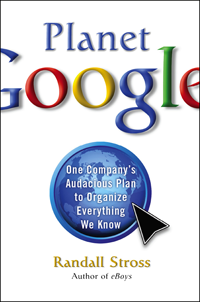
- Planet Google
- New Press (2008)
The way we live today has been determined not by American political dynasties or Saudi princes. The shapers of our lives are people like Jack Kilby, Douglas Engelbart, and Tim Berners-Lee.
Kilby invented the integrated circuit, making possible the personal computer. Engelbart invented the mouse, which made the graphic user interface possible. Berners-Lee gave us the World Wide Web, making The Tyee possible.
In the last decade, two other men have dramatically changed our lives without drawing much public attention. As computer-science grad students at Stanford in the 1990s, Larry Page and Sergey Brin shared an interest in search engines. Ten years after launching Google, they are among the richest men in the world, and arguably among the most influential.
Randall Stross's Planet Google is a 200-page book with a 50-page bibliography. It deals with many of the issues that Google has raised just by its existence. But it doesn't deal with either the creators of Google or with the world they created.
The rise of Reagan, Thatcher and the PC
The personal computer arose almost in step with the ascent of Ronald Reagan and Margaret Thatcher. Their vision of the hard-working entrepreneur has dominated the last three decades: Steve Jobs, Bill Gates, and plenty of other billionaires have clinched their argument.
Page and Brin stood on the shoulders of those giants. The web scarcely existed at the beginning of the 1990s. By the end of the decade, it ruled our lives, and old Yaletown warehouses were being rewired to serve geeks living on gushers of venture capital. The geeks were soon looking for honest work, but the web had triggered a tsunami of information. In the early '90s, you could ask the first browsers to choose a website at random, because so few websites existed. (In hindsight, this probably inspired Google's "I feel lucky" option.)
Why the early search engines failed
By 1998, search engines were struggling to find their way through the deluge. Their names are now nostalgia items: HotBot, AltaVista, Dogpile. They had good intentions and bad results.
Part of their failure, Stross shows, was thanks to their reliance on humans to judge the usefulness of websites. Page and Brin handed the job over to their computers. An algorithm, endlessly refined, found the websites that surfers themselves found useful. Success succeeded.
That basic principle has guided Google's continuing success, but has also led to some major controversies. Founded and staffed by computer engineers, Google didn't see much difference between the public domain and copyrighted material. This led to some spectacular battles with authors and publishers who didn't want their books copied for nothing.
Stumbling into billions
Similarly, the algorithm had problems recognizing copyrighted video clips, and brash startups like YouTube couldn't control what people uploaded. (Google eventually sorted the problem out, in part by buying YouTube.)
Page and Brin at first rejected the idea of advertising. They thought it would bias the rankings of hits. But after a cautious experiment, they adopted ads and turned Google into an enormous ad medium -- and moneymaker. Even in today's meltdown, Google's net income in the third quarter of 2008 was 26 per cent higher than a year ago. (Granted, its share price is roughly half what it was this time last year.)
Google started as a way to get somewhere else. Now it's also a place to hang around in. You can get your e-mail, create documents, do research, track the stock market and world news, look at your neighbourhood from space, watch videos and interact with online friends... without ever leaving Google's own pages. Most of us use only a fraction of its resources, but those resources are waiting for us.
Who are these guys?
Stross deals very well with how Google has grown, and with particular problems it's overcome -- whether intellectual property issues or the sheer speed of its own growth. But he doesn't show us much about Page and Brin, or about how they responded to those problems. Given the impact they've had on our lives, they seem very shadowy.
The book's long bibliography may offer more answers than the text itself. Stross heavily documents what he tells us. So anyone with the patience to surf to scores of websites will be able to read articles and blog posts that might turn Page, Brin, and their colleagues into three-dimensional figures.
Perhaps it's fitting that a mere print book can't begin to tell us much about the masters of hypertext navigation.




